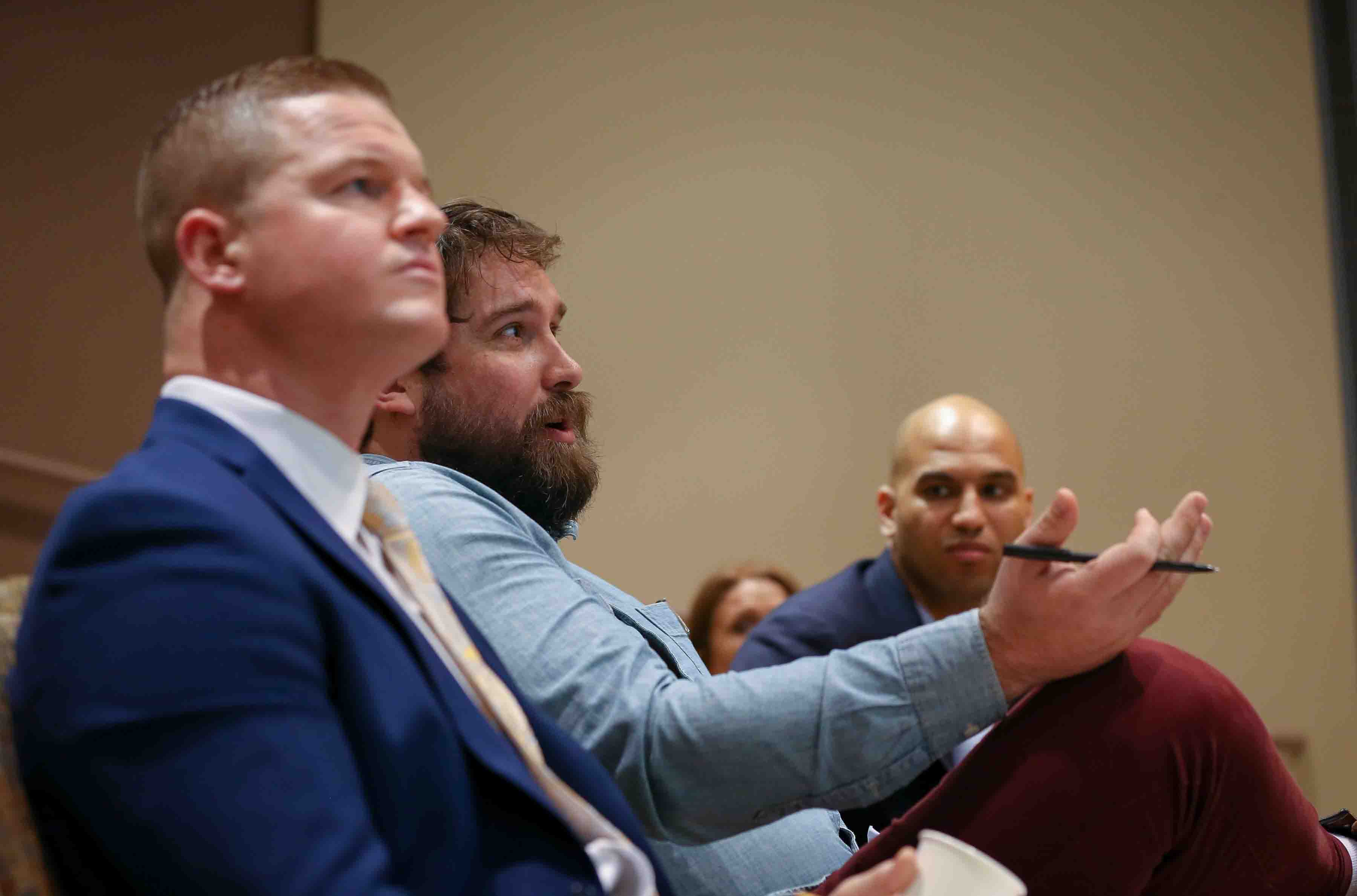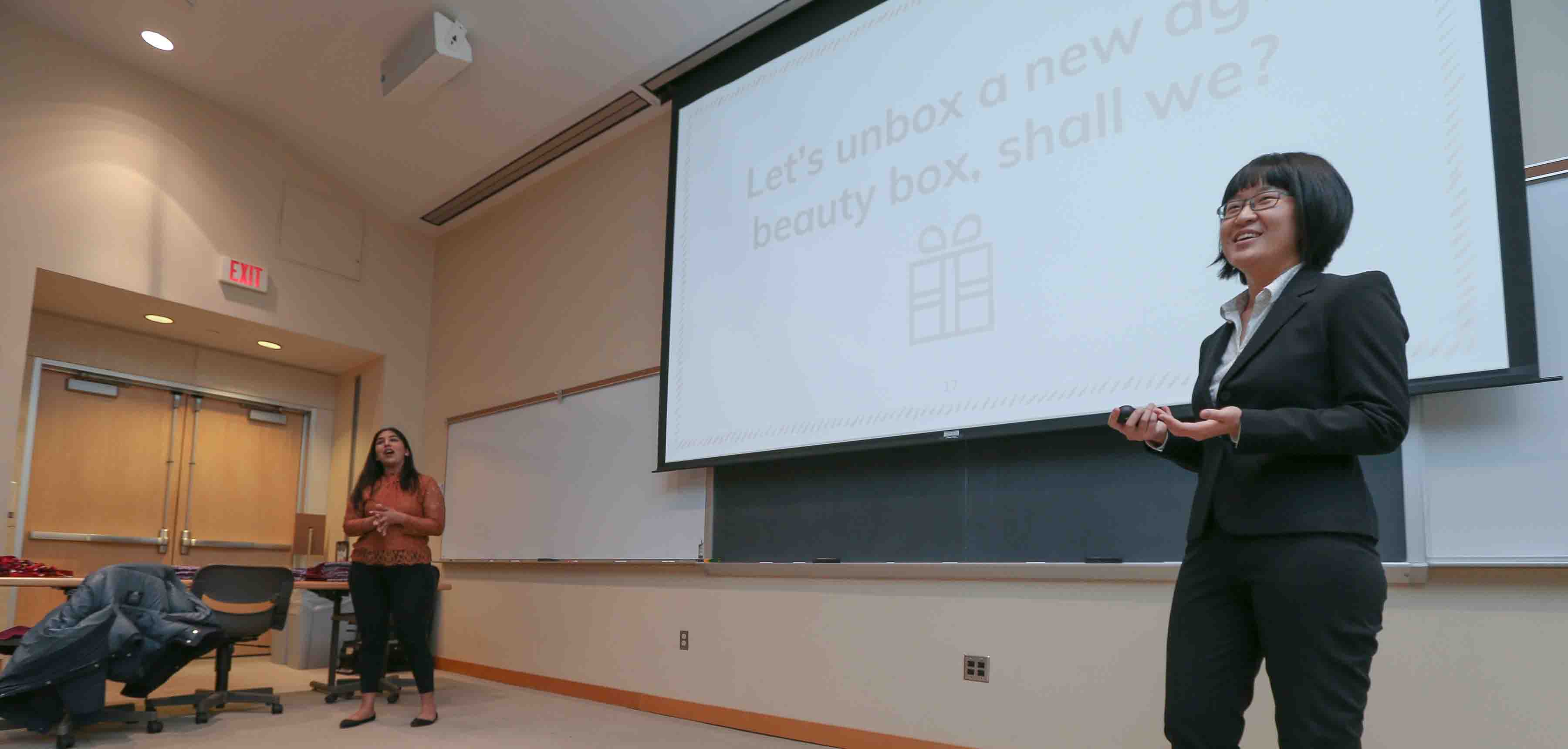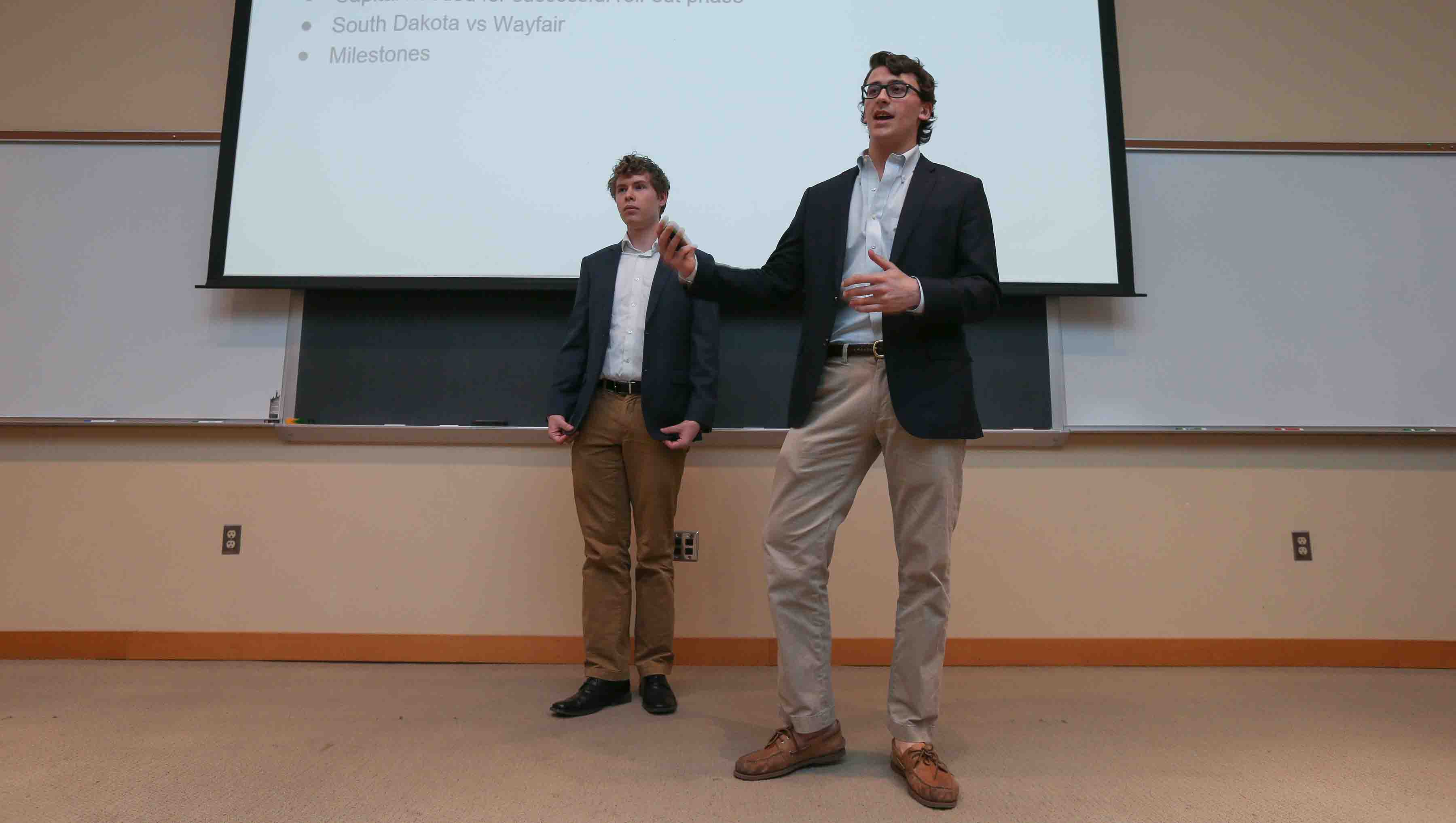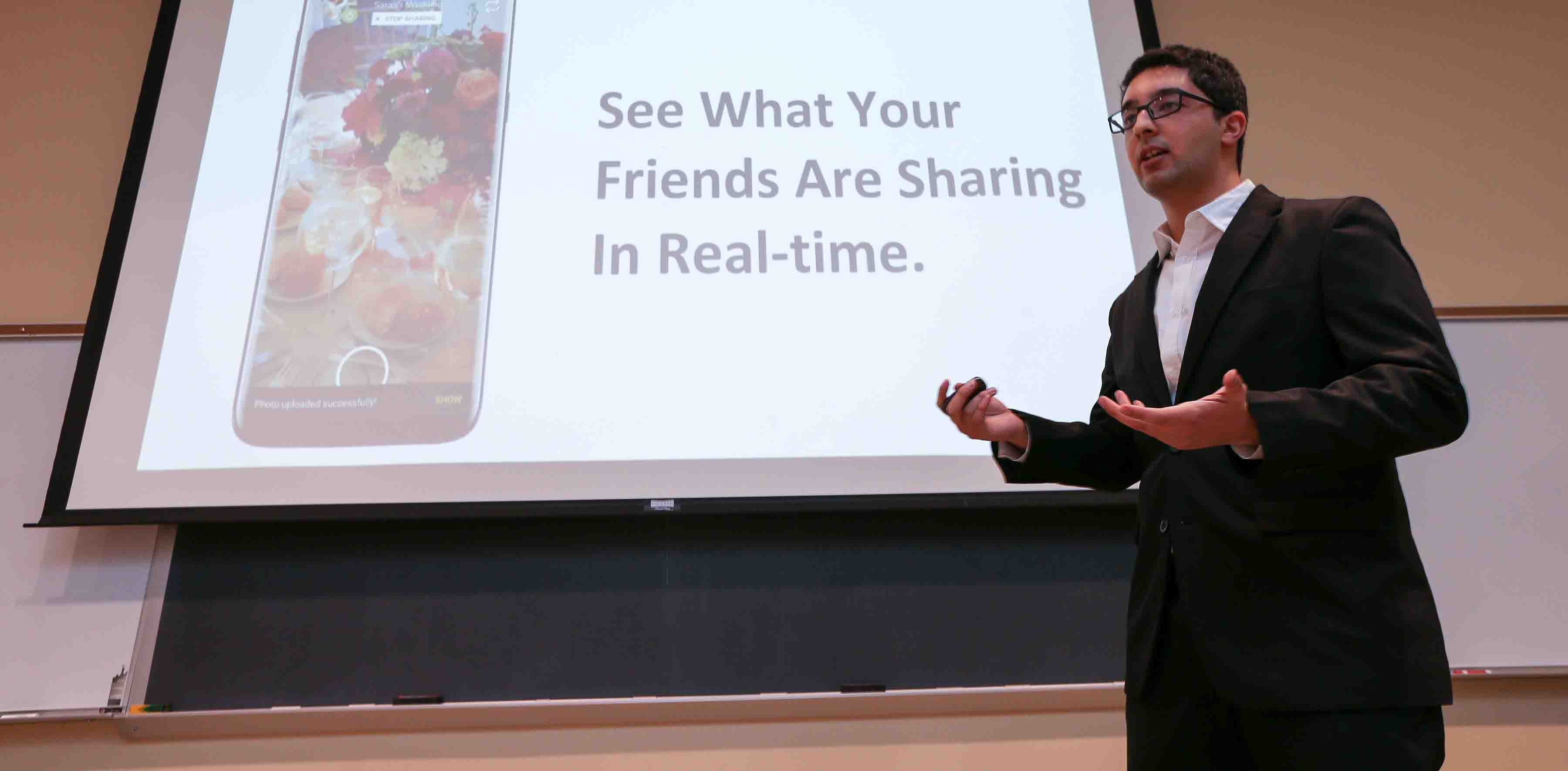By Stephen Wilson
You are on Shark Tank. Not pitching an idea, but sitting with the investors—a bankroll in your pocket itching for the right product. Here are the pitches:
Product #1: An online marketplace app for farmers and farmers’ markets to help local shoppers browse products and place orders to be picked up.
Product #2: A cosmetic subscription box for women of color who seek products specifically designed to match their skin tone and type.
Product #3: A location-based photo-sharing app that allows people to join a specific event and share images they snap with everyone in a single click.
Ready to roll the dice? As an angel investor, which product has the legs to make it to market?
Hopefully, you said all of them.
Seven student teams presented business ideas at the Dyer Center’s Business Plan Competition, but the products above placed in the top three. Win or no win, little would slow their momentum; the entrepreneurial spirit at Lafayette is strong enough that each product was already in development and at various stages of launch.

Valor Independent Group president Matthew Potter ’07 (L-R), Greater Easton Development Partnership executive director Jared Mast ’04, and Dyer Center director Yusuf Dahl, who served as judges for the competition
All credit goes to the newly established Dyer Center for Innovation and Entrepreneurship (formerly the IDEAL Center) and the energy generated by director Yusuf Dahl. The center’s programming culminated with a semester-long competition to prepare students for the entrepreneur’s journey.
Students listened to local, regional, national, and international business leaders. At the same time they dove into education sessions with Chris Ruebeck, associate professor of economics, on market analysis, Rosie Bukics, Thomas Roy and Lura Forrest Jones Professor of Economics, on financial fundamentals, and Dahl himself on business plan creation.
Why all the legwork? The winner would go on to represent the College at the Lehigh Valley Collegiate Business Pitch Summit. Hosted by Ben Franklin Technology Partners, the summit pits students from six colleges against each other for a chance to win the top prize.

Rukhmitha Shridhar ’18 (left) and Danhui Zhang ’18
Vying for the top spot at Lafayette were Rukhmitha Shridhar ’18 and Danhui Zhang ’18—both planning to start master degree programs with entrepreneurship as a focus. Their RuDi Beauty Box took second place.
Shridhar saw the business opportunity as other subscription services fell short of providing products that met her needs as a woman of color.
“Assessing skin requires true personalization that is not built into any existing subscription services,” she says. And she should know as a self-professed glamour girl.
“Since I was a little girl, I liked to play with makeup,” she says. “There is a power that comes with feeling good about yourself that I want to give to every woman.” The chemical engineering major has spent her time at the College working on the chemistry of cosmetics or what she calls “the science of girly.”
“I worked with Professor [Polly] Piergiovanni [professor of chemical and biomolecular engineering] during my senior year on the organic formulation of facial masks,” she says. “I would not trade this experience for anything.”
While she understood the art and science of beauty, Shridhar did need some business plan help, particularly on finances.
“Professor Bukics’ talk was really useful because I had no experience with finances and wanted to get it nailed down for the competition.”
Bukics discussed cash flow and profitability—how both are important but at different times and for different reasons—and on the relationships among the balance sheet, income statement, and cash flow statement.

Charley Western ’20 (left) and Jack Lapides ’20
Cash flow is crucial to farmers, which is why Jack Lapides ’20 and Charley Western ’20 focused their attention there. These first-year roommates used to talk about business ideas regularly. Finally, they got serious and narrowed their list to the top five and then to the one idea they liked the most.
CherryTree was born. Today, it is set to launch as a beta test for the Easton Farmers’ Market, allowing consumers to order fresh produce directly from the farmers. The app is available in the Apple and Android app stores, and the partners are working to secure markets in Connecticut, Massachusetts, Pennsylvania, Colorado, California, Washington, D.C., and Wisconsin.
They jumped into the competition because they were at the stage where they needed a business plan, so why not take the chance to get support on their plan and potentially earn some cash. They took third place.
Western is a farmers’ market aficionado and sees the app as a win-win.
“Consumers get an easy way to buy local food,” he says. “And farmers have free software to market themselves online.”
Marketing is not always a farmer’s priority. Nor are the four P’s—product, price, place, and promotion.
This is some of what Ruebeck discussed in his session—the structure to help students think about the different angles from which to view their product.
Such information helped Lapides and Western, who had never pitched an idea before. On the day of the competition, they drew the short straw and had to pitch first.
“While it would have been nice to watch someone else go first and see where they ran into trouble, we did OK,” says Lapides. “It wasn’t our best pitch when compared to some practice sessions, but holding that check at the end made it feel better.”
“We wanted to win,” says Western. “But there are many smart entrepreneurs here with very good ideas.”
All of the winners credit Dahl with providing crucial feedback and good advice.
The team that developed the photo-sharing software Apperture took that advice to heart and won first place. Their pitch was more like a demo.
Or so thought judge Jared Mast ’04, executive director for the Greater Easton Development Partnership.
“I was impressed with the student teams,” he says. “They excelled at presenting ideas that were not just purely conceptual. They were well thought out as true business models with key revenue and cost centers identified and how to scale over time.”

Wassim Gharbi ’19
The brainchild of Wassim Gharbi ’19, Zurabi Mestiashvili ’20, and Erik Laucks ’20, Apperture is also available in the app store.
“It is version two,” says Mestiashvili. “But we are almost done with version three… because it could always work better.”
Constant striving is this team’s goal as the students work to market the product and build a user base. Establishing the product is also urgent before another company decides to acquire it or develop a competitive product offering.
So some of the winnings will go to marketing, but the students are also using some to shore up some “legal stuff.” Again, they are following the good advice from Dahl as they walk further into the entrepreneur’s journey.



